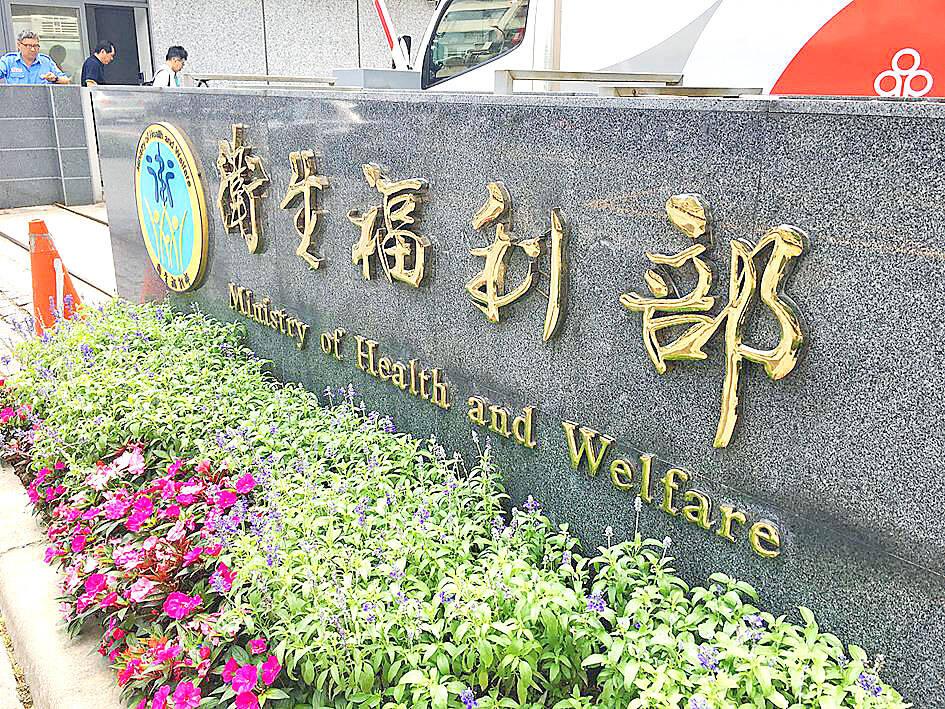About 220,000 people test positive for suspected cancer in screenings each year in Taiwan, but about 20 percent never receive follow-up tests or treatment, the Ministry of Health and Welfare said on Tuesday, adding that it would allocate NT$517 million (US$16.8 million) of National Health Insurance (NHI) funding to increase the follow-up rate.
Health Promotion Administration (HPA) data showed that 121,979 people were diagnosed with cancer in 2020 — meaning that one person in Taiwan is diagnosed every four minutes and 19 seconds, the ministry said.
However, as many cancers do not have any noticeable early symptoms, they are often not detected until it is too late, it said.

Photo: Lin Hui-chin, Taipei Times
The HPA offers five types of government-funded cancer screening for adults, and about 5 million people received the screenings each year prior to the COVID-19 pandemic, but only about 80 percent of those who test positive for cancer received follow-up tests and treatment, Minister of Health and Welfare Hsueh Jui-yuan (薛瑞元) said.
Those who test positive, but do not receive follow-up tests or early treatment could develop late-stage cancers, which would have worse prognoses and require more medical resources to treat, he said.
The HPA and the National Health Insurance Administration (NHIA) are today to launch a program working with hospitals to track suspected cancer cases from government-funded screenings and assist them in getting follow-up tests and treatment, he said.
The NHIA is to allocate NT$517 million to the program, with a goal to increase the rate of getting follow-up care to at least 90 percent, which is expected to benefit about 22,000 people, he added.
HPA Cancer Prevention and Control Division Director Lin Li-ju (林莉茹) said the program would establish a comprehensive mechanism for cancer screening, follow-up testing, diagnosing, administrating health consultations and referring people for treatment.
People who are eligible for government-funded screenings are advised to get them regularly, she said.
The five types of cancer screenings are fecal occult blood tests to detect colorectal cancer, oral cancer screenings, pap smears to detect cervical cancer, mammograms to detect breast cancer and low-dose computed tomography scans to detect lung cancer.
People who receive an abnormal test result do not have to panic, but they should follow instructions provided by the clinic or hospital and get a follow-up test for confirm the results, and seek early treatment if they are diagnosed with cancer, Lin said.
Regarding whether NHI funds should be used for preventive care rather than for treatment, Hsueh said the program would achieve both, as detecting diseases in their early stages and prescribing early treatment allows for more effective control over illnesses.
For example, people who receive an abnormal result from a fecal occult blood test might encouraged to get a colonoscopy, and if hyperplastic polyps are found and removed, it would not only qualify as preventive care, but as treatment, he said.

The brilliant blue waters, thick foliage and bucolic atmosphere on this seemingly idyllic archipelago deep in the Pacific Ocean belie the key role it now plays in a titanic geopolitical struggle. Palau is again on the front line as China, and the US and its allies prepare their forces in an intensifying contest for control over the Asia-Pacific region. The democratic nation of just 17,000 people hosts US-controlled airstrips and soon-to-be-completed radar installations that the US military describes as “critical” to monitoring vast swathes of water and airspace. It is also a key piece of the second island chain, a string of

A magnitude 5.9 earthquake that struck about 33km off the coast of Hualien City was the "main shock" in a series of quakes in the area, with aftershocks expected over the next three days, the Central Weather Administration (CWA) said yesterday. Prior to the magnitude 5.9 quake shaking most of Taiwan at 6:53pm yesterday, six other earthquakes stronger than a magnitude of 4, starting with a magnitude 5.5 quake at 6:09pm, occurred in the area. CWA Seismological Center Director Wu Chien-fu (吳健富) confirmed that the quakes were all part of the same series and that the magnitude 5.5 temblor was

Taiwan will now have four additional national holidays after the Legislative Yuan passed an amendment today, which also made Labor Day a national holiday for all sectors. The Chinese Nationalist Party (KMT) and Taiwan People’s Party (TPP) used their majority in the Legislative Yuan to pass the amendment to the Act on Implementing Memorial Days and State Holidays (紀念日及節日實施辦法), which the parties jointly proposed, in its third and final reading today. The legislature passed the bill to amend the act, which is currently enforced administratively, raising it to the legal level. The new legislation recognizes Confucius’ birthday on Sept. 28, the

The Central Weather Administration has issued a heat alert for southeastern Taiwan, warning of temperatures as high as 36°C today, while alerting some coastal areas of strong winds later in the day. Kaohsiung’s Neimen District (內門) and Pingtung County’s Neipu Township (內埔) are under an orange heat alert, which warns of temperatures as high as 36°C for three consecutive days, the CWA said, citing southwest winds. The heat would also extend to Tainan’s Nansi (楠西) and Yujing (玉井) districts, as well as Pingtung’s Gaoshu (高樹), Yanpu (鹽埔) and Majia (瑪家) townships, it said, forecasting highs of up to 36°C in those areas